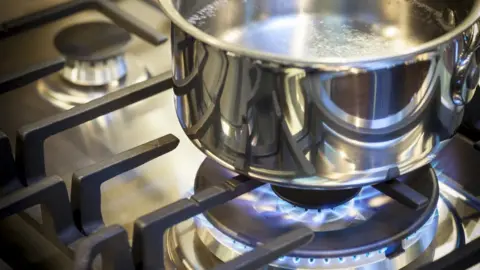SSE and Npower in energy merger talks
 Getty Images
Getty ImagesEnergy supplier SSE says it has been in talks with the owner of rival Npower with a view to forming a new UK energy company.
SSE said had been in discussions with Germany's Innogy about merging their UK gas and electricity supply businesses into an independent company.
Such a merger would bring together two of the UK's "big six" gas and electricity suppliers.
SSE, the UK's second-largest supplier, said the talks were "well-advanced".
SSE, formerly known as Scottish and Southern Energy, supplies energy to 7.77 million households while Npower serves 4.8 million.
Any merger - if allowed - would see the new company nipping at the heels of the market leader British Gas, which currently has 27% of the gas and electricity supply market, according to energy consultancy Cornwall Insight.

Analysis: BBC personal finance correspondent Simon Gompertz
It's well known that Npower has been struggling to make money.
And that its German parent, Innogy, is looking for a way to offload the business.
Like all the major suppliers, Npower and SSE face growing competition, with hundreds of thousands of people switching suppliers each month.
Plus they now have the prospect of the government capping their most important prices, their standard variable tariffs.
Combining the two would mean they could cut costs, so there's a danger of job losses.
However it's highly likely that the competition watchdog, the CMA, would want to check the deal before letting it through.
Together they would have 22% of gas and electricity customers.
Add in British Gas and the two biggest suppliers would have nearly half the market.
Even so shares in SSE rose by nearly 3%.

A combined SSE-Npower company would have a market share of 22.5%, with Germany's E.On trailing on 12%.
The other members of the "big six" UK suppliers are Scottish Power - which is owned by Spain's Iberdrola - and France's EDF.
Price cap pressure
The merger talks take place against an intensifying debate about how well the big six companies are serving UK customers.
Despite years of competition, many households do not switch supplier freely, leaving a large chunk on the most expensive Standard Variable Tariffs (SVTs).
About 12 million households are on some form of default tariff, which can cost hundreds of pounds a year more than the cheapest deals.
Last month, the government published draft legislation that would give energy regulator Ofgem the power to cap SVTs.
Business Secretary Greg Clark has said Ofgem should use its powers to impose a wider cap on energy bills more quickly.
But the watchdog has warned it could be sued by gas and electricity firms if it capped SVTs without the backing of new legislation.
Competition approval
Set against this, the established providers are losing market share to a growing band of small suppliers, with even local councils starting to sell their own energy packages.
Neil Wilson, analyst at ETX Capital, said: "The problem - and arguably the rationale - is that the big six are losing customers at a record pace to smaller suppliers. Smaller suppliers now account for more than 8% of market share, up from 1% just three years ago, according to Ofgem data."
Any merger deal between SSE and Innogy's Npower would need approval from competition authorities and shareholders.
In a statement, SSE said: "In discussions, SSE is mindful of the requirements of customers and the concerns of employees. It will disclose the outcome of the discussions as soon as they are concluded."
Innogy confirmed the two were in "advanced exclusive discussions".
SSE shares were 3% higher on news of the talks.
Energy regulator Ofgem said it would "advise relevant authorities if we were concerned that a merger would not be in consumers' interests."
